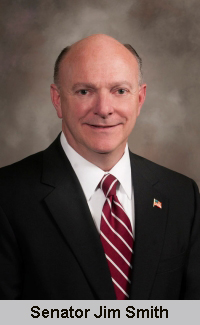
Editor’s Note: This is part of a series of blog posts by Nebraska’s term-limited senators reflecting on their time in the Nebraska Legislature. We thank them for their dedication and service to Nebraska. In this post, former Senator Jim Smith looks back at his years representing District 14. Senator Smith is now leading Blueprint Nebraska, a group of business, agriculture, government and higher education leaders who will develop a plan for economic growth and prosperity for Nebraska.
When I first ran for a seat in the Nebraska Legislature in 2010, one of the most frequent complaints I heard while talking to voters was about the Douglas/Sarpy County Learning Community. Legislative District 14 is in the heart of Sarpy County, where the Learning Community was reviled, and I made a campaign promise to get rid of it. During my first session in 2011, I quickly signed on to legislation that would dismantle the 5-year-old educational experiment and continued to advocate for its end.
All issues that come before the Unicameral for consideration are much more complex than simple, political sound bites. The Learning Community issue was no different. I found many of the components of the Learning Community unfair, ineffective and costly. Yet its underlying goal—to improve educational outcomes for all students in the two-county area—was laudable. Supporters of the Learning Community concept were fiercely defensive of its purpose and were going to protect it at all costs. I finally came to the conclusion that if the Learning Community was going to be successful, it was time to find some middle ground and start trying to improve it instead of trying to implode it.
I began by meeting with a small group of stakeholders including area superintendents and members of school boards and the Learning Community Coordinating Council. As a result, some of the more challenging provisions of the Learning Community statutes were identified and LB585 was introduced. Despite a strong focus on early childhood education for children in poverty, LB585 was not without controversy. At the public hearing, Learning Community advocates opposed the bill as a whole and questioned my motives. LB585 was nearly killed, but I assured skeptics that my intention was to make the Learning Community work without the constant divisiveness it created in the two-county area. I encouraged my colleagues on the Education Committee to work with me to find a compromise.
By the time LB585 reached the legislative floor for consideration, it called for changes in transportation requirements that would result in cutting costs by half and it reduced the Learning Community’s overall taxing authority. But the most important component of LB585 required the development of a plan for early childhood education programs for children in poverty while allowing funding for such programs through the Learning Community’s existing tax levy. LB585 passed on 41-0 vote.
Early exposure to education is proven to be vital for a child’s positive development and future success. Studies show that with good early childhood education programs, the need for special education goes down, crime rates drop, as does teen pregnancy, welfare dependency and job-training costs. Graduation rates and job productivity go up. Today, $2.9 million annually funds the Superintendents’ Early Childhood Plan developed as a direct result of LB585. In the 2016-17 school year, 3,612 children were enrolled in the comprehensive program in 339 classrooms across the Learning Community school districts.
LB585 is the perfect example of the good things that can happen when Nebraskans work together—putting aside conflict for the sake of compromise and politics for the sake of policy.
Senator Jim Smith
District 14


